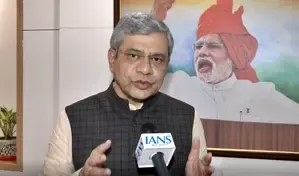Ineffective Governance Cannot Be Concealed by Divisive Tactics: Ashwini Vaishnaw to M.K. Stalin

Synopsis
Key Takeaways
- Poor governance cannot be masked by societal division.
- The Dravidian movement plays a crucial role in preserving Tamil culture.
- Stalin argues against the NEP favoring Hindi and Sanskrit.
- Concerns over the trilingual policy marginalizing Tamil.
- Historical resistance to Hindi imposition in Tamil Nadu.
Chennai, Feb 27 (IANS) Union Railway Minister Ashwini Vaishnaw criticized Tamil Nadu Chief Minister M.K. Stalin on Thursday, asserting that ineffective governance cannot be masked by superficial efforts to create societal divisions.
In a message on the social media site ‘X’, Ashwini Vaishnaw remarked: “Poor governance will never be hidden by shallow attempts to divide society. It will be intriguing to see what the Leader of the Opposition Rahul Gandhi has to say regarding this matter. Does he, as the MP of a Hindi-speaking constituency, concur?”
The senior BJP leader was responding to the Tamil Nadu Chief Minister's comments about the numerous Indian languages that Hindi has purportedly overshadowed.
Stalin claimed that Hindi has subsumed languages such as Maithili, Awadhi, Braj, Mundeli, Garhwali, Kumaoni, Magahi, Marwari, Malvi, Chhattisgarhi, Santhali, Angika, Ho, Kharia, Khortha, Kurmali, Kurukh, and Mandari, among others.
In a letter to party members on Thursday, Stalin argued that various North Indian languages, including Maithili, Brajbhasha, Bundeli, and Awadhi—spoken in Bihar, Uttar Pradesh, and Madhya Pradesh—have been suppressed due to what he terms the “hegemonic expansion” of Hindi.
He asserted that more than 25 indigenous languages in North India have vanished owing to the dominance of Hindi and Sanskrit.
Stalin commended the century-old Dravidian movement for its role in preserving Tamil language and culture through ongoing awareness efforts and protests.
He reiterated Tamil Nadu’s staunch opposition to the National Education Policy (NEP), accusing the Central government of promoting Hindi and Sanskrit under the pretense of educational reform.
In response to the BJP’s claim that the third language under the NEP could be a foreign one, Stalin insisted that, in practice, only Sanskrit is being emphasized in various states.
He pointed to BJP-ruled Rajasthan, where, according to him, Sanskrit teachers are being hired while Urdu instructors are overlooked.
He cautioned that if Tamil Nadu adopts a trilingual policy, there is a risk that Tamil could be marginalized, leading to increased Sanskritisation.
He noted that under NEP guidelines, while Sanskrit is being prioritized in schools, other Indian languages, including Tamil, are relegated to online formats.
“This clearly indicates that the Centre is planning to sideline languages like Tamil and impose Sanskrit,” Stalin wrote.
He reminded party members that Tamil Nadu’s two-language policy—Tamil and English—was first enforced by former Chief Minister C.N. Annadurai decades ago. Annadurai strongly opposed the imposition of Hindi and the perceived influence of Aryan culture on Tamil identity.
Stalin highlighted the state’s long-standing resistance against the imposition of Hindi, recalling the anti-Hindi protests of 1937–39, during which leaders like Periyar (E.V. Ramasamy) and members of the Justice Party actively fought against making Hindi mandatory in schools under the then C. Rajagopalachari-led government.
He also challenged the BJP’s criticism of blackened Hindi signboards at railway stations in Tamil Nadu.
He questioned whether railway stations in Uttar Pradesh display Tamil or other South Indian languages to assist passengers from the South, especially during events like the Kumbh Mela or Kashi Sangamam.
He further asked if announcements at railway stations in Uttar Pradesh are made in other Indian languages. Stalin affirmed that Tamil Nadu’s unwavering commitment to its two-language policy has significantly contributed to the state’s advancements in education, skill development, and employment opportunities.
He accused the BJP-led Central government of betraying Tamil Nadu and pledged to take all necessary actions to safeguard the Tamil language.
“We won’t oppose if you don’t impose. We won’t blacken Hindi words in Tamil Nadu. Self-respect is the hallmark of Tamils, and we will not permit anyone, regardless of who they are, to undermine it,” he declared.






